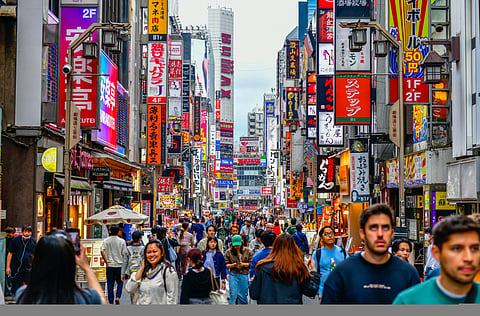
- Destinations
- Experiences
- Stay
- What's new
- Celebrating People
- Responsible Tourism
- CampaignsCampaigns
- SubscribeSubscribe
- Buy Now

Superstitious holiday makers travelling to Japan from key Asian markets have cancelled their bookings after rumours of a prophesied earthquake made the rounds on social media this past week.
Originally published in 1999, manga publication “The Future I Saw” by artist Ryo Tatsuki supposedly warned of a major disaster in March 2011, a date which turned out to coincide with the cataclysmic quake that struck Japan’s northern Tōhoku region that month. A “complete version” of the manga that was released in 2021, and according to the Ryo Tatsuki prophecy, the next big earthquake will strike in July.
“The sea boils south of Japan in July 2025 and it will cause a mega tsunami,” Tatsuki wrote in the manga. According to this Japanese writer's psychic predictions, the tsunami will stem from a violent underwater eruption that will hit Japan, Taiwan and Indonesia. The crack, she says, will appear under the seabed between Japan and the Philippines.
At the same time, psychics from Japan and Hong Kong have shared similar warnings, triggering unfounded panic online that has led to a flurry of cancellations of travel plans from destinations in the region.
Though scientists say the exact timing of earthquakes cannot be predicted, airline bookings from Taiwan, South Korea and Hong Kong have dropped since April—with bookings from Hong Kong, the fourth-largest source of tourists to the country, plunging by an average of 50 per cent versus a year ago, according to a media report. Weekly arrival bookings for late June to early July from the Asian financial hub have also nosedived by as much as 83 per cent.
The fear has also spread to other markets such as Thailand and Vietnam, where social media platforms are overflowing with posts and videos warning people to think twice before travelling to Japan.
Japan’s location in the so-called “Ring of Fire,” a region of heightened tectonic activity encircling the Pacific Ocean, makes it one of the world’s most earthquake-prone countries. Its last major earthquake was in 2011, which caused a devastating tsunami and nuclear disaster in Fukushima.
Japan has a booming tourism economy, with a whopping 36.8 million people visiting in 2024. Just a month ago in April 2025, the country recorded a record-breaking 3.9 million foreign visitors, lured by the cheap yen.
While posts and videos of widespread travel cancellations in Japan have gone viral, it has impacted bookings; plenty of people remain undeterred and plan to continue their journey to the island nation. They cite the country’s high standards in disaster preparedness as a key factor.
Mindful of the impact such fear mongering can have on its tourism industry, Japan’s Cabinet Office posted on X earlier this month to explain that modern technology has yet to be able to accurately predict an earthquake.
Yoshihiro Murai, the governor of Miyagi prefecture, which was hit hard during the 2011 quake, spoke out against the impact of superstitious beliefs on Japan’s tourism. “I believe it is a serious issue when the spread of highly unscientific rumors on social media had an effect on tourism,” he said during a press conference.
In 2011, evangelist Harold Camping predicted the end of the world on May 21, followed by “The Rapture,” in which millions of faithful believers would ascend to heaven. While some of Camping’s followers and other Christians altered their travel plans due to their beliefs in the prophecy, there were no reports of significant national or international tourism disruptions.
In a reverse example of the current situation, the so-called Mayan calendar prediction that the world would end in 2012 prompted a record of at least 23 million visitors to Mexico that year, according to the country’s Deputy Tourism Minister Carlos Joaquin Gonzalez.
(With inputs from multiple news reports)
